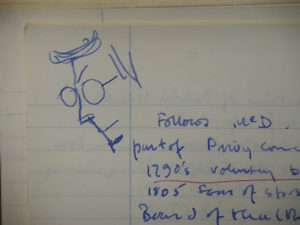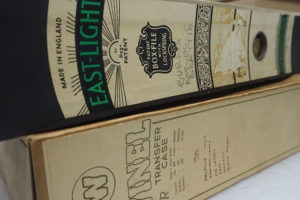“Detritus: to keep”: Shedding light on the work of Nicholas Tindal Phillipson
In the next part of the series of blog posts about the Archive of European intellectual life, project archivist Miriam Buncombe, looks at the papers of Nicholas Tindal Phillipson (1937-2018).
The archival papers of Nicholas Tindal Phillipson (1937-2018) provide a total immersion into the world of the Scottish Enlightenment. Indeed, initial preparations of a box-list for the collection made clear very quickly that to describe draft pages as ‘research notes on Enlightenment thought’ was of no help at all in differentiating the twelve crates stuffed with papers exploring myriad facets of this period. Capturing his extensive research and teaching, Phillipson’s papers unfurl a lifetime’s dedication to developing and sharing a detailed and nuanced understanding of the Scottish intellectual world of the eighteenth century.

Nick Phillipson studied first at the University of Aberdeen before moving to study at Cambridge. Yet though comments from tutors on his early essays suggest intellectual promise, they also indicate room for improvement. Perhaps this was because Phillipson spent at least part of his time during lectures sketching charming caricatures around the edge of his notes, rather than giving his full attention to the topic at hand – the reader is left to guess which classmate or tutor is depicted. It seems to have been taking Duncan Forbes’ Special Subject on ‘Hume, Smith and the Scottish Enlightenment’ at Cambridge which fully caught Phillipson’s attention, and that topic remained at the core of his intellectual pursuits for the rest of his career. Phillipson went on to write well-received biographies of both Adam Smith and David Hume. The only brief excursion from these central interests was during a stint of National Service which involved teaching the GCE course at RAF Coltishall. Here, Phillipson’s lectures on British history expanded into the history and nature of terrorism, as well as a few informal talks on the nature of life and faith.
Over five decades of research on the Scottish Enlightenment, diving deep in political philosophy of thinkers such as Adam Smith, Adam Ferguson and William Robertson, Phillipson did not lose his enthusiasm for the topic. His notes show that he regularly revisited and reintegrated previous research, with now somewhat cryptic notes – such as the titular ‘detritus: to keep’ – gracing the margins of many of his drafts, to point him to the potential of phrases and ideas developed in one project for new life in another piece of research. His archival papers provide a tangible link to the foundation of Phillipson’s research: a detailed examination of the eighteenth-century records written by the minds he was seeking to understand, and capturing the mindset and context of their world in its own terms. Copious well-ordered notes remain as testament to long hours spent with ledgers, letter-books and bundles dispersed across Scottish collections. Phillipson was to draw upon this expansive awareness of the archival record and expertise, honed over his career, in a new history of Enlightenment Scotland. Though this remained incomplete at the time of his death, unpublished chapters on the Literati, Scottish development post 1745 and on Thomas Reid were well underway and remain with his papers.

Phillipson delighted not only in discovering the complexities of the Scottish Enlightenment but in sharing this enthusiasm with others. Between 2002-2005, together with Susan Manning, he developed and ran a series of Colloquia on the Science of Man, one of the many ways his work contributed to the growth in Scottish Enlightenment Studies as a discipline. His skill in bringing colour and relevance to political thinkers of this period was demonstrated in the popularity of his 2010 biography of Adam Smith. It was this publication for which he was awarded the Saltire Book Award, an unexpected recognition which greatly pleased Phillipson. Yet he was no stranger to drawing out the relevance of political thinkers of the eighteenth century for new audiences. Teaching at summer programmes at Yale he drew lines between the thought of David Hume and American political ideology. It is clear that he was open to engaging with the wider academic community, travelling to conferences from St Petersburg to Taipei to discuss Enlightenment thought and working as part of the board for the Civitas project on the teaching of British history within schools. A generous and thoughtful teacher, his notes on doctoral work for examination demonstrate a real joy in the discovery of new scholars sharing his own engagement with his chosen research area.
With most of his life spent teaching at the University of Edinburgh, the development of that University through the Enlightenment and the spirit of the city surrounding it became another area of specialisation. Reflecting the philosophy of the enlightenment thinkers of his research, Phillipson’s own research interests led him to view the city not only through its political thinkers, but through writers such as Walter Scott and the works of artists such as Raeburn and Samuel Swarbreck. Participation in the Edinburgh Festival brought together his interests in the Arts, the Enlightenment and Edinburgh and his great ability in sharing his knowledge with new audiences. He was a member of the Festival’s board for many years, and several lectures given at the festival and reviews of its exhibitions form part of this collection.
Phillipson’s papers represent a rich resource for the exploration of Enlightenment Studies, through the lens of one man’s life-long passion for this dramatic period in Scottish intellectual history.
Miriam Buncombe
Project Archivist
Dear Miriam Robinson. Thank you for this excellent article. I met Dr Phillipson when he was at Canberra in 1988. Would his stay here be covered in the archive. Thank you Stephen Holt Canberra ACT
Dear Stephen, thank you for your comment. Please send your query to [email protected] and someone will reply to you via email.